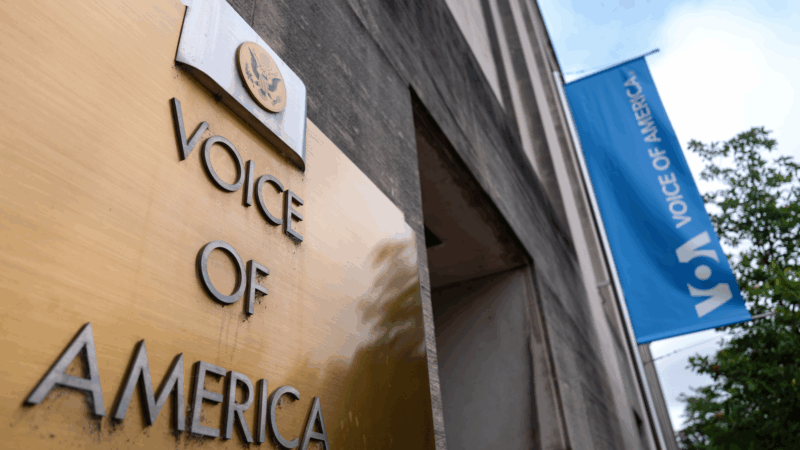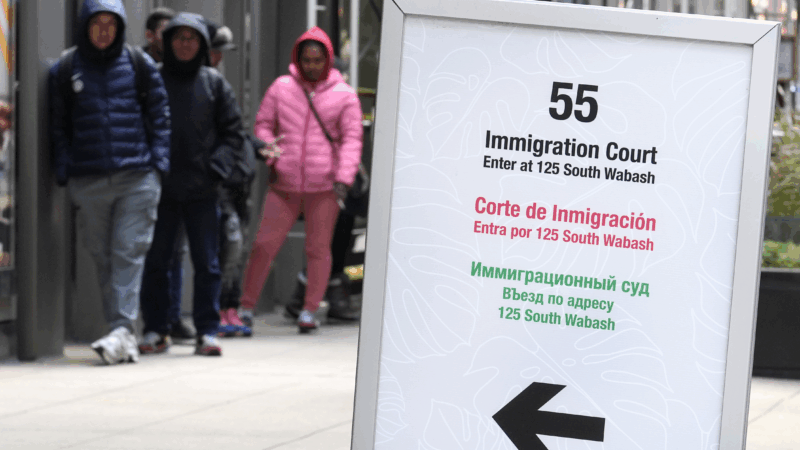Reporters for Voice of America and other U.S. networks fear what’s next
On Friday, the Trump administration issued mass layoff notices gutting the agency that owns the Voice of America and funds its sister news outlets.
That same day, a correspondent arrested in Azerbaijan while working for one of those sister networks — Radio Free Europe/Radio Liberty — was sentenced to nine years in prison on charges his bosses consider bogus.
Given recent headlines about their employers, other journalists for the federally funded news outlets who are foreign citizens say they wonder whether they will have the U.S. government’s support if they become victims of political retribution by their countries’ leaders.
About 1,400 jobs, or 85% of positions, are being eliminated at the U.S. Agency for Global Media in keeping with an executive order issued in mid-March by President Trump, senior White House adviser Kari Lake said on Friday. The cuts all but wipe out the Voice of America, which has broadcast news coverage and cultural programs to people living under repressive regimes since World War II.
“For decades,” Lake said in a written statement, “American taxpayers have been forced to bankroll an agency that’s been riddled with dysfunction, bias, and waste. That ends now.”
People who had been working for the agency prior to Trump’s second term took grave exception to her actions.
“The scope of the agency’s actions appears massive and would eviscerate Voice of America’s congressionally mandated role to provide objective news to closed societies and other places around the world,” Michael Abramowitz, the Voice of America’s director, said in a letter to colleagues. He is currently on involuntary paid administrative leave but had not received a layoff notice by Friday afternoon.
Before these new notices to staffers, Lake already had fired more than 500 contractors at Voice of America, many of whom are citizens of other countries and brought journalistic and language skills to their roles at VOA. Lake has been seeking to hold back payments designated by Congress to the other government-funded international networks, which are technically private nonprofits. Those include Radio Free Europe/Radio Liberty, Radio Free Asia and the Middle East Broadcasting Networks.
Lake’s actions have cast doubt on the government’s commitment to non-American journalists working around the world for those networks. Some have risked their lives and their livelihoods to cover thorny issues affecting their home countries.
“I am very concerned about the fate of many of our journalists at Voice of America,” Abramowitz tells NPR. “The U.S. government has a moral obligation to do everything in its power to make sure those who worked on its behalf stay out of harm’s way.”
The case of Farid Mehralizada
On Friday, Radio Free Europe/Radio Liberty reporter Farid Mehralizada was sentenced to nine years in jail in his native Azerbaijan for smuggling, tax evasion, and forgery — charges that network executives and human rights groups say are false. In a statement read in court, Mehralizada, who is also an economist, said he had sought through his reports to offer his expertise on the challenges facing the country with his fellow Azerbaijanis.
“The only way to achieve sustainable economic development in any country is for citizens to understand the essence of economic processes, to ensure participation in decision-making, and to guarantee freedom of expression,” Mehralizada said in his statement, which was shared with NPR. “Unfortunately, journalism in our country today is almost equated with terrorism.”
During his more than year-long imprisonment awaiting trial, Mehralizada missed the birth of his child. Radio Free Europe/Radio Liberty President and CEO Stephen Capus called for Mehralizada to be returned to his family.
“RFE/RL’s U.S.-funded journalists work in some of the most dangerous environments imaginable,” Capus said. “Farid’s case is a tragic example of the risks that come with reporting uncomfortable truths.”
Colleagues at Radio Free Europe/Radio Liberty are similarly imprisoned in Belarus, Russia, and Russia-occupied Crimea.
Three Vietnamese freelance journalists for Radio Free Asia are currently serving prison terms ranging from six to 11 years in Vietnam.
Three journalists for the Voice of America are in prison as well, in Azerbaijan, Myanmar and Vietnam.
A scramble to find refuge
VOA journalists who are citizens of countries where the government represses the media, or is hostile to the U.S., fear what will happen if they return home when their non-immigrant J-1 visas expire at the end of the month.
Many are scrambling — with help from colleagues — to find other jobs in the U.S. Some are seeking asylum.
The half-dozen Voice of America journalists in this situation who spoke with NPR come from countries in Africa, Eastern Europe and Asia. They share a similar refrain: They say if they return home, they are likely to be prevented from working, imprisoned or worse.
One reporter for a foreign language service of Voice of America says he fears returning to his West African home. (NPR is not using his name or his home country at his request for fear of repercussions for him and his family members.)
Media outlets in his country are shut down when they cover the regime critically — or even when they simply report on protests. Foreign news organizations can be thrown out. He says he came to the U.S. because it became increasingly perilous to report openly in his home country or neighboring nations.
“They’re not going to throw me a parade,” the Voice of America journalist tells NPR. “They see people working for international networks as a spy. I can just disappear, you know? They could kidnap me or [I could] go to jail.”
He says he also fears for his family.
“It’s just a gut punch”
Ivana Konstantinovic was a news anchor and producer based in Washington D.C. for the Voice of America’s Serbian-language service until her contract was terminated as part of Lake’s mass firings of contractors this spring. She was fired once before, during the first Trump administration, but returned two years ago. She says Serbia is not as repressive as Russia but reporting there is fraught. An analysis by the Committee to Protect Journalists found that attacks against members of the media there are on the rise.
“Serbia is a country where [the] government targets independent journalists,” Konstantinovic says in a text message. “We were all invited here to D.C. because of our experience, language skills, connections with target audience, understanding of the political landscape, etc. VOA needed us.”
Voice of America’s press freedom editor, Jessica Jerreat, argues that Trump’s executive order wrongly sends the opposite message.
“Now they’re just discarded,” Jerreat says of the foreign journalists. “After this executive order, you’re no longer needed. It’s just a gut punch for all the service and expertise these people bring.”
Jerreat, who is among the Voice of America staffers now suing the network, received her own termination notice on Friday.
Lindsey Vonn says she suffered ‘complex tibia fracture’ in her Olympic downhill crash
The 41-year-old star said her torn ACL was not a factor in her crash. "While yesterday did not end the way I had hoped, and despite the intense physical pain it caused, I have no regrets," she wrote.
Guerilla Toss embrace the ‘weird’ on new album
On You're Weird Now, the band leans into difference with help from producer Stephen Malkmus.
Nancy Guthrie search enters its second week as a purported deadline looms
"This is very valuable to us, and we will pay," Savannah Guthrie said in a new video message, seeking to communicate with people who say they're holding her mother.
Immigration courts fast-track hearings for Somali asylum claims
Their lawyers fear the notices are merely the first step toward the removal without due process of Somali asylum applicants in the country.
Ilia Malinin’s Olympic backflip made history. But he’s not the first to do it
U.S. figure skating phenom Ilia Malinin did a backflip in his Olympic debut, and another the next day. The controversial move was banned from competition for decades until 2024.
‘Dizzy’ author recounts a decade of being marooned by chronic illness
Rachel Weaver worked for the Forest Service in Alaska where she scaled towering trees to study nature. But in 2006, she woke up and felt like she was being spun in a hurricane. Her memoir is Dizzy.






